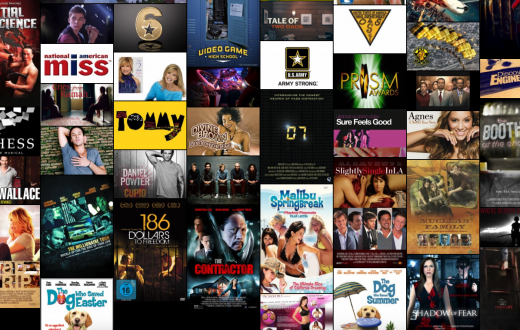Newer actors face a terrible dilemma that’s familiar to anyone who has ever searched for a job just out of school in this era of late capitalism. It can be summed up like this imaginary job ad:
“Entry level positions now hiring – must have 5 years experience.”
Uh…what? How do I get experience for an entry-level job? Especially if no one will hire me until I have experience?
The same logic (or lack of logic) applies to what many young actors are told as they’re just getting started in the professional acting world: in order to book roles, you must have a good resume and a lot of credits under your belt. Until that happens, you aren’t going anywhere. But come on now. How on earth are you supposed to get those credits? Were Brad Pitt and John Malkovich just hatched out of the womb with a shiny resume and acting reel gripped in their little paw?
No. No, they weren’t. Here’s the thing about not having too many credits just out of school: there are ways to get yourself some credits, and even accumulate material for a reel that will help you book gigs and get yourself going. Here’s how!
1. Credits And Experience Aren’t The Same Thing
First of all, let’s be clear: you may not necessarily need a whole lot of professional credits to get started on a solid career path, it’s true. But what you absolutely DO need is experience. Please don’t confuse the two. It’s tempting for young actors just out of school to think that their education in acting is complete and they don’t have to worry about taking classes ever again. Nothing could be further from the truth. Acting is a life-long learning process; I’ve worked with students in their 60s and 70s. And you learn from every director you work with, every actor you share a scene with, every script. Even senior-citizen actors who are incredibly accomplished like Patrick Stewart and Ian McKellan talk about continuing to learn while they act. So, maybe consider your university-level education or community theater experience the equivalent of having completed elementary school, having given you the tools to prepare you to move on to middle school. I promise, you won’t know how little you know until you learn more, so get yourself in scene study, improv, on-camera and audition classes and keep at them. It can only help you, even if it’s just in terms of more practice, but I list this topic first because as you’ll see below, classes are a great jumping off point for most of the other ways you can help yourself get started as an actor with few or no credits.
2. Self-Tape Everything
So what’s an actor to do who hasn’t booked anything to speak of? Start off by opening your mind about what could potentially be used in a reel: while you’re working in your classes to perfect monologues and scenes, bust out your phone and record that mess! Using some snippets of monologues or short clips of scenes you did in a class – as long as they’re tight and show you at your best – are by no means off-limits when you’re just out of the gate. And when it comes to self-submitting, directors and CDs are more interested in whether you can act than if you have a massive resume. So take some time to polish some of your favorite monologues, and find a scene partner who helps you show off your best chops, and then record it and create yourself a reel. As you start to book more paid roles, you can substitute clips from those in and swap out your classroom and home-made bits. And here’s a dirty little secret: at this stage of your budding career, you’re looking at landing commercial roles, small roles in stage shows and non-speaking roles in films. For a lot of these type of roles, your appearance is just as important as your acting abilities. So if you can put together a one- to two-minute reel that gives casting teams some idea your basic look and your type as an actor, you could be well on your way.
3. Get On Stage And In Front Of The Camera
Another great jumping off point from post-school acting classes is they are wonderful sources of networking opportunities. For one, the actor looking to gain experience can find out in classes about plays that are looking for actors, which is incredibly valuable experience for learning the nuts and bolts of acting which you can later learn to translate for on-camera and audition work. But perhaps more importantly, in classes you can find out about people who are filming their own projects and need actors to volunteer their time. Usually these kind of projects offer actors something like lunch and…drum roll please…material for their reel! Student filmmakers and indy filmmakers are constantly trawling acting classes for actors looking for help on their projects. Get yourself involved and you can wind up playing roles that might honestly be a little above your pay grade at this point – which is great! What’s more, this is a great opportunity to play roles that might be more challenging, more out of the box, and more against type than you are likely to encounter elsewhere at this stage of your professional career. And when all is said and done, those are scenes you can really use to your advantage to sell yourself when you self-submit a reel. A lot of people kind of dismiss the idea of the doing zero-budget indy or student film work for free but there are two good arguments against that notion. One, at this stage of your career, you just need to work, work, work, and then work some more, in order to gain the skills and the confidence you will need when you step in front of the camera for that big audition down the road. Two, here’s where you, even as a recent graduate, can jump into a lead role or a main supporting role, and get an opportunity to play characters that no professional casting director is likely to consider you for at this point. And the best part of all, is it’s all being recorded!
4. Be Creative
I just interviewed a mid-level actor (to be published here next week!) who reminded me of something that’s often forgotten by actors just starting out: the importance of being creative. Sure, we all realize we’re in a creative field, and that creativity in a general sense is an important part of acting. But this guy, a very successful pro who’s been in Hollywood for over two decades working opposite people like Denzel Washington and Christian Bale and Russell Crowe started casually talking about how he’s writing a couple of pilots – which is so cool! Especially for younger actors, its so easy to get caught in a trap of always trying to be somebody else for other people, trying to cram your personality into whatever box they’re casting for. That’s boring, not only for you, but also for other creatives. Making your own work from scratch is an amazing way to show directors, producers and casting directors that you’re not just another empty vessel waiting to be filled with their instructions. So write with your friends, work out scenes, write yourself monologues – whatever moves you and shows you off – and get it on video! A secondary thing to keep in mind along with this is that there are plenty of people out there who have made it from these kinds of self-initiated projects alone, without ever having built up a big ol’ resume!
4. Self-Tape, Self-Submit, And Get To Work!
You’re in the right place to get your material in front of the decision-makers who can help make your career. So once you get a bit of a polished reel together of your monologues and scenes, remember you can direct submit to directors right here on NYCastings. You’ve got free uploads, and you can easily swap in and out videos as you improve. Also don’t forget to check the auditions page every day for hundreds of the latest projects looking for actors in your area now! So what are you waiting for? Get to recording!







